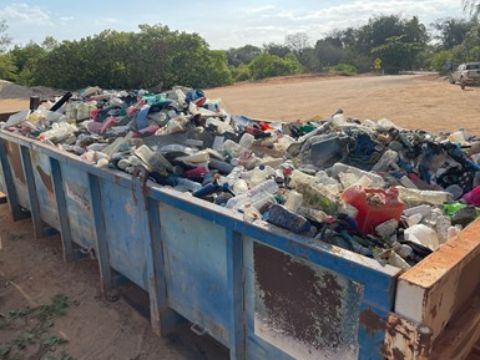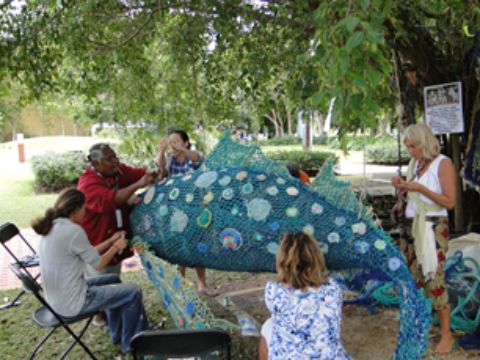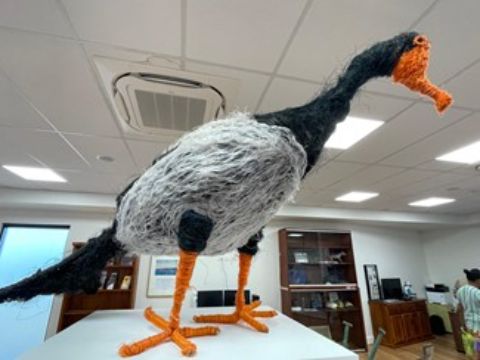- Charles Sturt University artificial intelligence (AI) experts and behavioral scientists are supporting coastal clean-ups on remote north-west Cape York and to reduce landfill pollution
- The Charles Sturt collaboration with Plastic Collective and Wei’Num Arts on Cape York will provide equipment, education and training programs in recovery, repurposing and recycling of marine debris
- The program will empower Indigenous women artists, develop a creative revenue opportunity and provide income, while enhancing the environment
Charles Sturt University artificial intelligence experts and behavioral scientists have joined with a leading plastics recycling organisation and First Nations community artists in remote Cape York to transform marine litter into valuable artworks.
A $400,000 Ghost Net Innovation Grant from Parks Australia received earlier this year enables Plastic Collective and Charles Sturt University to work with Wei’Num Aboriginal and Torres Strait Islander Arts and Craft Corporation to deliver specialised equipment to Mapoon and Napranum remote communities in the northwest Cape York region.
 Senior Lecturer and deputy leader of Machine Vision and Digital Health in the Charles Sturt School of Computing, Mathematics,
and Engineering Dr Anwaar Ulhaq is leading the project as the chief investigator.
Senior Lecturer and deputy leader of Machine Vision and Digital Health in the Charles Sturt School of Computing, Mathematics,
and Engineering Dr Anwaar Ulhaq is leading the project as the chief investigator.
Dr Ulhaq said the successful integration of a digital marketplace and innovative technologies such as AI will amplify the impact of this community-based project, simultaneously empowering both the community and the environment.
“Our project not only cleans the seas but empowers communities, embarking technology’s embrace for a brighter, greener tomorrow,” he said.
“This community-focused project is incredibly thrilling as it encompasses various elements, including empowering Indigenous communities and artists, conserving marine life (particularly turtles), cleaning our oceans, recycling plastic, and integrating innovations with AI and mobile software development. To me, it is a highly impactful project and has the potential to be a game-changer.”
 Collaborating with Ms Louise Hardman, CEO of Plastic Collective, and partnering with Wei’ Num Arts in northwest Cape York, the project is co-designing an Ocean Arts program titled ‘Hunter Gatherers Mamas’.
Collaborating with Ms Louise Hardman, CEO of Plastic Collective, and partnering with Wei’ Num Arts in northwest Cape York, the project is co-designing an Ocean Arts program titled ‘Hunter Gatherers Mamas’.
The AI experts at Charles Sturt will use AI and digital platforms to develop a culturally appropriate marketplace for artists to enable the tracking of materials, as well as an international sales platform for people to purchase authentic and verifiable ghost gear art directly from the artist.
Plastic Collective fosters a network of remote community projects turning plastic waste into a recycling profit.
The program facilitates women in remote communities in Northern Australia to turn plastic pollution into a creative revenue opportunity. They are supported by a new online marketplace, tailored training, and essential repurposing equipment to produce artworks from fishing ‘ghost nets’ and marine debris.
The project will also deliver a co-designed digital marketplace app to sell their products directly to the wider public and assess the social impact of the project over two years.
Ms Hardman said, “Providing a grass-roots approach to empowering remote communities to turn waste plastic into valuable resources, is a proactive solution to addressing the plastic problem and providing gainful employment.
“This program will empower Indigenous women artists, providing income for them and their families, as well as supporting coastal clean-ups and reducing landfill which causes soil, air and water pollution.
“In the longer term, this pilot program will also be easily replicable and available for other remote communities as a marketplace for repurposed ocean artworks.”
Manager of Wei’Num Arts Mr Kevin White said, “Wei’Num Arts and Crafts is very pleased to work with, and support Plastic Collective and Charles Sturt University, who were awarded a grant in early 2023 to help and advise Wei’Num Arts and the Mapoon community to use ghost nets and marine debris as a resource for high quality artwork, repurposed items, and other saleable items”.
 Essential educational and training programs in recovery, repurposing and recycling of marine debris will be provided to local Indigenous Land and Sea Rangers, who collect marine debris along remote coastal beaches, as well as the women artists to create and sell products made from up to 70 per cent of the ghost gear and marine debris.
Essential educational and training programs in recovery, repurposing and recycling of marine debris will be provided to local Indigenous Land and Sea Rangers, who collect marine debris along remote coastal beaches, as well as the women artists to create and sell products made from up to 70 per cent of the ghost gear and marine debris.
Western Cape York coastlines have one of the highest concentrations of marine debris and ghost nets in Australia where discarded coastal and fishing gear flow down on currents from surrounding countries.
Indigenous Land and Sea Ranger groups and environmental clean-up groups regularly remove marine debris from the remote beaches, which are important marine turtle nesting sites.
Materials recovered will be sorted and categorised for Reuse Items and Repurposed Arts, which represents an estimated 50 per cent of collections.
 Training programs in these remote communities have commenced in material identification, sorting and processing materials to recover the highest value for income generation.
Training programs in these remote communities have commenced in material identification, sorting and processing materials to recover the highest value for income generation.
Plastic Collective is working with expert marine debris artists including Sue Ryan (Ghost Net Art, Atherton), Lynette Griffiths (Ghost Net Collective, Cairns), Zoe De Jersey (Wei’ Num Arts, Mapoon) and Erin Smith (Ocean Sole, Nairobi, Kenya).






Social
Explore the world of social